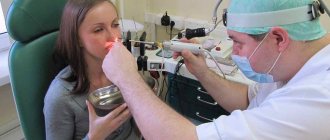Pulmonology is a relatively new branch of medicine, which began to develop especially actively at the beginning of the twentieth century, when scientists learned to differentiate tuberculosis and other pulmonary diseases. Despite such scientific “youth”, pulmonology is one of the most important sciences, since it deals with the study and treatment of the respiratory system. In modern conditions, it is closely intertwined with such fields as oncology and allergology.
A pulmonologist is a doctor who diagnoses and treats pathologies of the bronchi, lungs, larynx and other organs of the respiratory system. Specialists in this industry also pay a lot of attention to preventive measures.
Brief information
A pulmonologist is a representative of a narrow specialization; he is a typical general practitioner who deals with diseases of the respiratory tract, in particular, various pathologies of the bronchi and lungs.
There is a division into an adult and a pediatric specialist. But often at appointments in district and sometimes regional institutions there is only an adult doctor who treats the entire population. This is not entirely true, since the focus of the work of a pediatric pulmonologist has a number of specific features.
Content:
- Brief information
- When is consultation needed?
- Diagnostic approaches
- Characteristics of the activities of a pulmonologist
- How to get an appointment
- Where does the specialist meet?
- What does pulmonology mean, what does a pulmonologist do?
For a pediatric pulmonologist, objectivity is important when seeing this category of patients. After all, during a consultation, children are often simply unable to accurately say and describe the clinic and the signs that bother them. Often they cannot even state their main complaints. Working with children differs from examining adults, since it is necessary to take into account the characteristics of a child’s body at different ages, be able to persuade a child to undergo an examination, and listen to the lungs in conditions of extreme behavior of a small patient.
Pulmonology departments, clinics and institutes deal with the problems of respiratory diseases. On the one hand, these are narrow specialists, on the other, pulmonologists know the intricacies of a huge range of different pathologies. After all, respiratory tract problems are among the most common in the human population today.
Treatment methods
If, after an examination, the pulmonologist chooses radical treatment, the patient is prepared for surgery. Otherwise, drug therapy or treatment with devices is carried out, the patient follows a diet, a certain daily routine, etc.
Depending on the symptoms and diagnosis, treatment takes the form of:
- antibacterial therapy;
- anti-inflammatory therapy;
- prescribing antitussives;
- taking special medications to dilate the bronchi and eliminate bronchospasms;
- administering antiseptics internally using the endoscopic method or using pleural puncture.
As a hardware treatment, you can use: electrophoresis, bronchoscopy, heating.
When is consultation needed?
A pulmonologist deals exclusively with diseases of the bronchopulmonary system. Therefore, you should consult a doctor if you have characteristic symptoms of damage to these structures. The most common and common signs of respiratory tract damage include:
- Attacks of a smoker's specific cough
This kind of complaint often occurs in the morning. Only copious expectoration of sputum alleviates the condition and well-being of patients. The formation of viscous sputum greatly complicates coughing; it is prolonged and does not bring relief. Such a clinic often indicates the development of a chronic form of bronchitis. Without timely and adequate therapy, emphysema, severe respiratory failure quickly develops, and chronic obstructive pulmonary disease (COPD) often develops.
- Normal cough
Why does cough occur? In fact, the brain, namely its cough center, is responsible for the occurrence of this symptom. Activation occurs when the respiratory tract is exposed to an irritant. Coughing is a protective mechanism that is aimed at eliminating dust, mucus, and foreign particles that enter the respiratory tract. Diseases accompanied by cough are quite dangerous. Indeed, in the course of insufficient examination and therapy, symptoms often worsen and progress. That is, the inflammatory process in the upper respiratory tract spreads to the bronchi and lungs. This aggravates the course, complicates recovery and increases the risk of complications. In such cases, consultation with a pulmonologist is urgent and extremely important. Only with its help can you determine the true cause of the problem and begin the necessary treatment.
- Dyspnea
This symptom has a number of features and can occur:
- at rest - often develops due to problems with the lungs, indicates emphysema - the true cause of the decrease in inhaled air or the presence of extensive pneumonia. The condition of a severe form of cardiac dysfunction during physical activity may also be relevant - there is an increase in the number of respiratory movements with the slightest changes in body position: turning in bed, eating, getting up;
- may be due to difficulty in inhaling, which is more common with changes in the bronchopulmonary system, obstruction in the bronchi due to inflammation or external compression;
- due to difficulty in exhalation, especially in heart failure;
- combination with difficulty in exhaling - the first symptom of diseases such as obstruction, asthma; if they occur, a conclusion from a pulmonologist will be required, and you should additionally visit an allergist; This way it will be possible to identify a dangerous disease in the early stages, and, accordingly, eliminate the possibility of aggravation.
- Bronchial asthma
This is a severe, chronic disease in which attacks of difficulty breathing are clinically observed. Patients complain of a feeling of lack of air, dry cough. There is a lack of oxygen, severe compression of the chest, and shortness of breath. Inhalations are short and exhalations are slow, wheezing occurs that can be heard from a distance. There is pallor, cyanosis, and the veins in the neck swell. The cough is unproductive and does not bring relief. An increased heart rate and muffled heart sounds are also noted. Transition to severe asthmatic status is possible. Bronchial asthma can develop against the background of allergies, or as a result of an infectious inflammatory process.
Diagnostic approaches
Pulmonology is a clinical area in which an objective examination by a doctor is the key to making a diagnosis. The completeness of this procedure depends on his qualifications. First of all, a detailed survey of the patient is carried out, complaints are collected and detailed, followed by an objective examination using auscultation, percussion and palpation.
Often, to clarify the diagnosis in severe, advanced cases, a number of additional tests are required. There are several main areas here:
- skin testing;
- general blood analysis;
- blood serum testing for the presence of specific immunoglobulins;
- carrying out provocative tests - applicable within the framework of remission of the disease.
Very often the clinical picture of the disease is quite confusing. Therefore, to clarify the diagnosis, an instrumental examination of the patient is required. For this, it is often used:
- echocardiography;
- CT scan;
- radiography of the OGK;
- determination of external respiration (spirography);
- bronchoscopy.
An organism is a system of organs that are interconnected. Therefore, it is impossible to evaluate each organ structure separately; therefore, when examining and making a final diagnosis, consultation with related specialists is often required. We are talking about a cardiologist, oncologist, endocrinologist, neurologist, allergist, infectious disease specialist.
Pulmonology Center Integramed
Our clinic has been successfully helping patients cope with diseases of the thoracic cavity (respiratory) organs for more than 10 years. Treatment of pulmonary diseases is our main focus.
|
Characteristics of the activities of a pulmonologist
Doctors of this specialization are engaged in the examination, diagnosis and treatment of diseases of the lower respiratory structures. The identification of such a narrow specialization occurred historically, due to the huge number of ailments of these organs.
Several groups can be distinguished according to their etiology:
- infectious – bronchitis, pneumonia;
- hereditary – cystic fibrosis;
- allergic – bronchial asthma;
- professional – asbestosis, anthracosis;
- traumatic – pneumothorax;
- illnesses of unknown origin - sarcoidosis, fibrosing alveolitis.
The specialist additionally monitors and monitors the dynamics of patients with chronic obstruction, emphysema and pneumosclerosis. Often it is the pulmonologist who diagnoses tuberculosis and lung cancer.
Reviews from our patients
IntegraMed is an example of a high-quality approach to human health.
Professional care, qualified assistance, attention and warmth are the best medicines of the company’s doctors. My family and I trust our health to IntegraMed specialists. IntegraMed +7 Moscow, Mazhorov Lane, 7 5 stars -
“An example of a high-quality attitude towards health”
Maria Sittel “IntegraMed” is an example of a high-quality attitude towards human health. Professional care, qualified assistance, attention and warmth are the best medicines of the company’s doctors. My family and I trust our health to IntegraMed specialists. Maria Sittel
Presenter of the news program “Vesti”
“When it seemed impossible to save a life, the Lord sent Dr. Andrei Kuleshov to help my family.
He and his team of doctors fought until the end. They succeeded in something that was beyond the control of many eminent medical professionals in Moscow and the Far East. The child is alive! My gratitude to Andrey Kuleshov and his colleagues is limitless.” Integramed +7 Moscow, Mazhorov Lane, 7 5 stars - “They succeeded in something that was beyond the control of many”
Peregudov Valery Vladimirovich When it seemed impossible to save a life, the Lord sent Dr. Andrei Kuleshov to help my family. He and his team of doctors fought until the end. They succeeded in something that was beyond the control of many eminent medical professionals in Moscow and the Far East. The child is alive! My gratitude to Andrei Kuleshov and his colleagues is limitless. Peregudov Valery Vladimirovich
Captain 1st rank, deputy commander of the Red Banner 16th submarine squadron of the Pacific Fleet
“From our experience, we are convinced that we have the best doctors, the best diagnostic capabilities and clinical care at the highest world standards. Health is priceless - trust it to the best!” Integramed +7 Moscow, Mazhorov lane, 7
5 stars —
“B are the best doctors!”
Vladislav Borodinov and Irina Garus From our experience, we are convinced that we have the best doctors, the best diagnostic capabilities and clinical care at the highest world standards. Health is priceless - trust it to the best! Vladislav Borodinov and Irina Garus
European Champions, Finalists of the World Professional Ballroom Dancing Championships
“I would like to note the rare combination of medical and managerial professionalism, which always leaves the impression of excellent service.” Integramed +7 Moscow, Mazhorov lane, 7
5 stars —
“A rare combination of medical and managerial professionalism!”
Dmitry Anatolyevich Gulin I would like to note the rare combination of medical and managerial professionalism, which always leaves the impression of excellent service. Dmitry Anatolyevich Gulin
President of the Association of Russian Automobile Dealers, Member of the Group Board
“I am happy to recommend it to my family and friends! Here I received high-quality care from real professional doctors, faithful to the Hippocratic Oath.” Integramed +7 Moscow, Mazhorov lane, 7
4 stars —
“I recommend the company!”
Larisa Gennadievna Zelkova I will gladly recommend you to my family and friends! Here I received high-quality care from real professional doctors who were faithful to the Hippocratic Oath. Larisa Gennadievna Zelkova
Deputy General Director
How to get an appointment
For timely diagnosis and adequate therapy, it is extremely important to know where and who to turn to for help. A general practitioner often refers a patient to a pulmonologist when he or she has some doubts about the diagnosis and therapy. But at the same time, anyone who makes an appointment can consult with a specialist.
According to international criteria, there are a number of indications for which consultation with this specialist is important. Among them:
- prolonged cough;
- shortness of breath with slight exertion;
- chest pain;
- frequent ARVI (more than 3 times a year).
In addition, they are sent for consultation during preventive examinations. Every year, many undergo fluorography of the lungs. If the slightest changes are detected, the patient is immediately sent to the pulmonology office. This happens especially often with people working in hazardous industries.
Prevention
Prevention of bronchopulmonary diseases consists of giving up bad habits, observing safety measures when working in unfavorable conditions (dust, chemical fumes), and regularly undergoing fluorography to assess the condition of the respiratory system.
To protect against infectious diseases, it is important to follow the rules of personal hygiene and take safety measures during an unfavorable epidemiological situation. Hardening and proper nutrition are important factors that help maintain good immunity and reduce the risk of infection.
To train the respiratory system, it is useful to exercise, sing, and play wind instruments.
If a patient is diagnosed with pathological processes in the lungs, it is important to undergo regular preventive examinations and follow the recommendations of the attending physician.
Where does the specialist meet?
You can contact this doctor in a clinic, private institution, or clinic. The only significant difference is the number of people and the pricing policy. Everyone chooses for themselves: a live queue and reasonable price, or a more expensive appointment by appointment. The entire complex of examination, testing and therapy remains unchanged. This is in no way dependent on the reception location. The main essence of private service privileges is the speed of diagnostic procedures.
You can also find a doctor using the Internet. Online consultation is indeed less reliable, but it is accessible and very convenient. It allows you to ask questions, describe the clinical picture of the disease, receive specialized answers, and, if necessary, make an appointment. That's why a great way, according to experts, is to go to the website of a specialized doctor in your hometown. This will greatly simplify the task.






